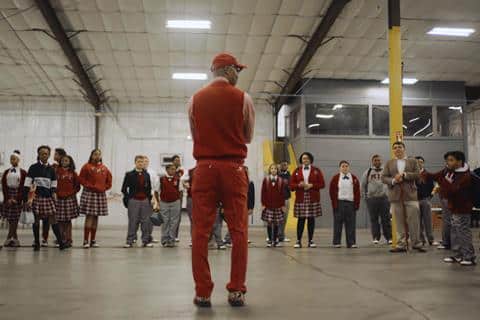Read also:
How to Watch FX Live Without CableHow To Watch AMC Without CableHow to Watch ABC Without CableHow to Watch Paramount Network Without CableDan Chen’s documentary starts as a celebration of Black success but pulls back the curtain to ask more enticing questions about racial inequities in education.
This review is part of our coverage of the 2021 Tribeca Film Festival.
We’ve all seen those viral videos that circulated Instagram and TikTok a couple years back — thrilling, giddy footage of young Black and Brown students crowded around another student with a laptop, bursting into cheers and elation when that student learns they’re accepted into a prestigious Ivy League school. It’s a moment of tremendous uplift, especially considering the dramatic divides in college acceptance rates between white and nonwhite students (to say nothing of the Ivy League).
When filmmaker Dan Chen began documenting the students of Louisiana’s T.M. Landry Preparatory School, his goal was simply to capture the process by which this school’s students achieved a 100% college acceptance rate, with at least a third of them going to Ivy League schools. It’s an astounding statistic, especially for a school populated mostly by Black and Brown students. But in a classic case of filmmaking serendipity, Chen was firmly entrenched in the school by the time it became embroiled in scandal — one involving abusive teachers, falsified transcripts, and a heaping helping of education fraud.
Like all good filmmakers, Chen rolled with the punches, and ended up with Accepted, a riveting social-issues doc that also plays out like a grand tragedy as well as an indictment of the racism endemic to American education.

For its first half, Accepted refuses to tip its hand that something untoward is about to happen to the bright-eyed, vibrant young kids of T.M. Landry. Chen immerses us in the hypnotic classrooms and assertive teaching style of school founder Mike Landry, who operates somewhere between Denzel Washington in Remember the Titans and R. Lee Ermey from Full Metal Jacket. His is a tough-love approach, cleanly dividing his classrooms into winners and losers and hammering the thin statistics of Black success into his students. At first, it reads as breaking his students down so they can grow back stronger — America, after all, will show them no quarter, and so he wants to motivate these kids to succeed despite those disadvantages.
But then the New York Times publishes a 2018 exposé detailing T.M. Landry as a school rife with verbal and emotional abuse, much of it at the hands of Landry; that Coach Taylor approach starts to read as dehumanizing in retrospect. Add to that the fact that Landry doctored transcripts of his students to get them into Ivy League schools, and the illusion of Landry’s magical success rate begins to dissipate. Fittingly, Mike Landry himself is unapologetic, even as more and more of his tactics seem to rely on commodifying social justice and diversity measures into conning people into taking his students on false pretenses. At one point, he even likens himself to Jesus Christ on the cross, being “crucified” for his sins. “God knows what’s right.”
Of course, it’s impossible to think of the T.M. Landry scandal without remembering Operation Varsity Blues, in which the children of wealthy actors and businesspeople forged transcripts and tests to get their kids into Ivy League schools. Accepted leans into that comparison in its final act, and that’s where the doc places its aforementioned scandals in an even more engrossing context.
It’s hard not to feel for everyone involved, even those responsible, for wanting to do whatever it takes to succeed in a world that doesn’t want them to.
How mad should we be at Landry for trying to boost his hard-working students’ chances of getting into Ivy League schools they deserve to attend when rich white folks do even more to get their spoiled, privileged brats opportunities they’re set to squander? Lori Loughlin’s kid doesn’t need Harvard; her life won’t be changed for the better. For the students of Landry, it can mean the chance at a good life.
And what about the students at the center of the scandal? Intriguingly, Accepted grants them the space to be as conflicted by the affair as we are. Students we see inspired in the first half come back later and admit they were coached to perform for the camera by the teachers. Some feel betrayed by Landry; others feel guilt and shame at the house of cards on which their academic futures are built. Others feel defensive of Landry and the work he’s done, and a few even claim they didn’t count what they saw at the school as abuse.
It’s hard to get to the truth, or even find reconciliation when an institution like Landry’s is presented as the only way out of a life of poverty, and an entire community has staked its sense of identity on the successes it touts. It’s hard not to feel for everyone involved, even those responsible, for wanting to do whatever it takes to succeed in a world that doesn’t want them to. And for the kids for whom their hard work and diligence still wasn’t enough to break through those racial barriers.
But in leaning into the complexities and contradictions of the scandal — and its broader context in the already-stacked deck of the American education system — Accepted manages to put not just T.M. Landry on trial, but the system that made it necessary in the first place.